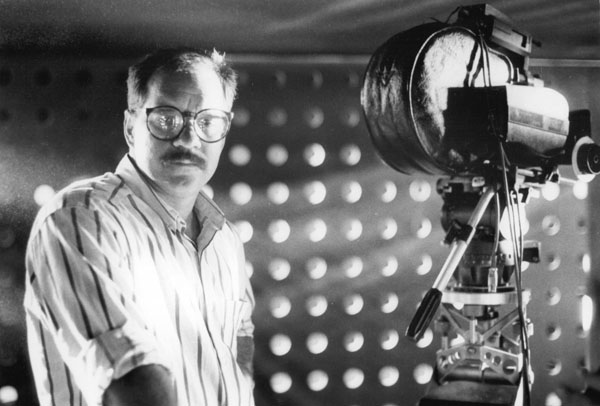The UCLA Film & Television Archive and UCLA Department of Film, Television, and Digital Media are presenting Hardcore: The Films of Paul Schrader through August 5. Writing for Artforum, Nick Pinkerton:
Schrader had once briefly managed that rarest of tightrope acts, creating uncompromised works with both a rarefied, withholding aesthetic and mass-market appeal, but the sixty-six-year old hasn’t had a mainstream crossover since 1997’s Affliction, itself mostly a succès d’estime. With The Canyons, Schrader is going for de scandale, collaborating with tabloid covergirl Lindsey Lohan, XXX matinee idol James Deen, and Bret Easton Ellis, the American Psycho novelist more recently renowned as a dyspeptic Twitter celebrity….
Infamously, Schrader’s origins couldn’t be further from such secular excess. Raised in a strict, abstemious Dutch Calvinist community in Grand Rapids, Michigan, he didn’t see his first movie until the age of seventeen. Once Schrader was on his own, he followed this famine with a gluttonous feast, and sinful movie love lured him to UCLA. Applying the rigorous exegesis that his church upbringing had instilled in him to his new zeal for cinema, Schrader launched himself as a critic, writing on noir loners among other topics germane to his future filmmaking and, in 1972, he published his landmark study Transcendental Style in Film: Ozu, Bresson, Dreyer. The book’s subjects showed Schrader’s continuing interest in matters of the spirit, although by then he had developed sacrilegious tastes. Schrader landed his first Hollywood deal with the screenplay to The Yakuza (1975), co-written with brother Leonard, but it was an autobiographical purge influenced by Bresson’s Diary of a Country Priest that would really make Paul’s name: Taxi Driver.
And for Bookforum, Nick Pinkerton reviews Curtis Harrington‘s Nice Guys Don’t Work in Hollywood: The Adventures of an Aesthete in the Movie Business, in which the “great and laurel-strewn share the stage with the humbler exotics of Hollywood Babylon—those landladies and busybody spinsters, an unhinged studio secretary, a dance studio proprietor-cum-producer trying to ‘fix up’ his Brooklyn hermaphrodite buddy, and Cameron Parsons, the widow of a rocket scientist and high-ranking Satanist. Even Harrington’s time at Universal Studios is given the aspect of a dark fairy tale, for this is the era of the MCA takeover, when a warlock named Lew Wasserman ran his fiefdom from what his servants on the lot called the ‘Black Tower.’ When Harrington writes about showbiz, as when he writes of the everyday, he finds it touched with an aspect of mystery and Magick.”
As an addendum to Jonathan Marlow‘s interview with Joshua Oppenheimer, here, via VICE, are Werner Herzog and Errol Morris discussing The Act of Killing:
Michael Atkinson for In These Times: “There’s never been a film quite like it, and the reasons are twofold: One, filmmaker Joshua Oppenheimer approaches his subject matter—Indonesia, its militia culture and its recent history—with wild inventiveness, allowing his subjects to be co-creators in the process, with startling and surreal results. Two, Indonesia itself. Whatever you may know about it from NPR or the New York Times won’t prepare you for what you see here of the country’s blood-soaked dementia.”
For Slavoj Žižek, writing for the New Statesman, The Act of Killing “provides a unique and deeply disturbing insight into the ethical deadlock of global capitalism…. The trap to be avoided here is the easy one of putting the blame on either Hollywood or on the ‘ethical primitiveness’ of Indonesia. The starting point should rather be the dislocating effects of capitalist globalisation which, by undermining the ‘symbolic efficacy’ of traditional ethical structures, creates such a moral vacuum.”
“The importance of the Mack Sennett Comedies in the evolution of cinema is immense,” wrote Robert Desnos in 1927. “But must we not once again suspect American hypocrisy for having hindered his free development?” Ted Fendt‘s translated the piece Desnos’s piece for Le Soir.
John Strausbaugh: “Whether she was performing in Yiddish or English, on Second Avenue or in Hollywood, there was never any question that Molly Picon was Jewish. Very Jewish.”
New York. In Slant, Ela Bittencourt has an overview of Latinbeat, while in the New York Times, Mike Hale notes that there’s a “strain of melancholy” running through Japan Cuts. Both series are on through July 21.
Oakland. “In the past year, Shapeshifters Cinema has brought a wide variety of film performance practitioners (as well as a few video-based performers) to Oakland for unique monthly shows,” notes Brian Darr. “Right now they reserve the second Sunday of each month for these events. Tonight it’s Kent Long and Vanessa O’Neill performing under the name Beige; along with O’Neill’s Suspension, the duo will perform with Long’s lovely 2003 work The Waves, and a pair of completely collaborative pieces: Which Ceaselessly Float Up (which was performed at the New York Film Festival’s Views from the Avant-Garde last autumn) and The Pass.”
Writers and editors at The Dissolve consider cinema’s greatest dissolves.
A video essay by Kevin B. Lee.
In the works. Vincent Gallo “has been announced as the final cast member for director Junji Sakamoto’s suspense drama Human Trust, which finished filming in Japan, Russia, Thailand, and the U.S. this past spring,” reports Charlie Schmidlin at the Playlist. “Centered on the legendary ‘M Fund,’ a supposed stash of treasure from WWII, the film follows a conman Yuichi (Kôichi Satô of Sukiyaki Western Django) as he’s hired to travel across the globe and steal the money by two mysterious men.”
List. Sean Gilman picks the “Best 2012 Movies of 2013.”
Obit. “Bollywood’s legendary actor Pran, who played both heroes and villains in several Hindi film classics over six decades, died of pneumonia at Mumbai’s Lilavati Hospital on Friday,” reports the AP. “He was 93.”
For news and tips throughout the day every day, follow @KeyframeDaily on Twitter and/or the RSS feed. Get Keyframe Daily in your inbox by signing in at fandor.com/daily.




